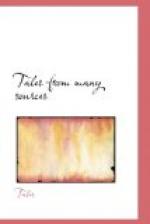“Do you think,” she says at last, very slowly, “that if—if he were rid of me, he would marry her? Does she care for him?”
“I don’t think about it. Yes, it is very strange; but, child as she is, he has perfectly infatuated her.”
There is another long pause, during which he eagerly scans her face. Suddenly her eyes light up, and she returns his glance.
“Are you really willing to marry me?” she says.
“Why do you ask?” he returns, simply. “Are my eyes not honest?”
Virginia smiles. “If you mean it,” she says, “go now, and write me the same words to-night or to-morrow.”
So, as she bids him, he goes.
* * * * *
Lord Harford had set down nothing in malice. What he told Virginia is absolutely true. Philip Vansittart is in love with a gay, pretty child, whose winsome tricks have coiled her round his heart. He has never spoken one word of love to her, for he feels and knows himself as much bound to Virginia as though the marriage-tie he once so utterly abhorred linked them. He no longer, strange to say, thinks and speaks so evilly of marriage. Were he free, would he not joyfully chain himself with all the bonds that church and society can impose to this sweet young life which would make him young again? He has no thought or desire to blast this girl-life as he had done Virginia’s. Perish the thought! When these ideas come to him, he hates and loathes himself; he makes superhuman efforts to drive them away—but the limpid blue eyes come and look at him over his briefs; the childish voice rings in his ears in the night watches! He grows pale and haggard. At last he makes a mighty resolve.
“Virginia,” he says, two nights after Lord Harford’s visit to her, “let us be married!”
He takes her hand kindly, but his eyes do not meet hers, and the tender inflection of yore is missing from his voice.
Virginia betrays no surprise. Poor soul! She understands too well.
“Why?” she says quietly. “I think we are very well as we are.”
“No,” he returns hastily, “we are not! My views have changed on the subject—changed entirely. Marriage is the best thing. It decides your fate. To live as we do is neither one thing nor the other.”
“You forget,” she says, in a tone so calm as to be almost unnatural. “This state has great advantages. There is no tie between us. If either of us tired of the other, there is nothing to hinder our parting, to-morrow—to-night even.” He looks at her, speechless with amazement. Her eyes do not flinch from his. “If,” she continues, with that terrible calmness,—“if you wanted to marry Miss Constance Devereux; if I wished to marry—let us say, Lord Harford—there is nothing to prevent it except,” slowly, “the unwritten law of a faithful heart.”
Philip Vansittart leans his face between his hands. He cannot find a word to say. He is smitten with remorse, for he knows well enough that she is faithful. But why that allusion to Lord Harford?




